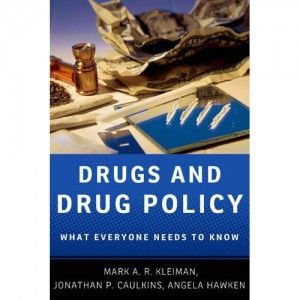 Pepperdine’s School of Public Policy’s Dr. Angela Hawken co-authored a book on U.S. drug policy and the legalization of marijuana this summer. The book, “Drugs and Drug Policy: What Everyone Needs to Know,” breaks down issues involving marijuana legalization on both socioeconomic and governmental levels.
Pepperdine’s School of Public Policy’s Dr. Angela Hawken co-authored a book on U.S. drug policy and the legalization of marijuana this summer. The book, “Drugs and Drug Policy: What Everyone Needs to Know,” breaks down issues involving marijuana legalization on both socioeconomic and governmental levels.
“This November, three states have ballot initiatives to legalize the sale of marijuana,” Hawken said. “This is of enormous policy significance. We thought it was important to write a book that set the record straight (as well as we could) on marijuana. There are many marijuana myths. We worked hard to present the evidence in a balanced way and to identify the big unknowns.”
Hawken, an economics and policy analysis professor, said she thinks the lack of precedence is a contributor to the overall unfamiliarity when it comes to marijuana legalization. However, much can still be drawn from governments who are more lenient with their drug laws than the U.S.
“There are many misconceptions about marijuana,” Hawken said. “Among the most important is that marijuana legalization has been tried before. The Netherlands and Portugal are often cited as examples. Those places have decriminalized the possession of marijuana, but sales are not legal. So we have no examples of legal marijuana to learn from. This leaves us scrambling in the dark about what to expect if marijuana were legal. This should make us less bold about the conclusions we draw. Because for many of the issues at stake, we just don’t know.”
Hawken claims public opinion of the book was largely positive, as was support from the Pepperdine community.
“The book has been well received by policymakers, think tanks and even many advocacy groups,” Hawken said. “So far, the press has been very kind to us. And we are pleased at the endorsements from organizations and scholars from all sides of the argument.”
Keith Hinkle, the senior vice president for Advancement and Public Affairs, said the administrative stance is that of support and pride. However he was “not aware of any changes [to public policy]” because of the release.
“We are supportive and proud of all of Angela’s extraordinary work,” Hinkle said. “She is a most gifted scholar that is willing to address some of our biggest policy challenges as an academic enterprise, we value the search for truth and realize that drugs and the social, physical and mental impacts of drugs in our culture are policy issues that we are all concerned about.”
Because the book has three authors rather than just one, Hawken claims that differing opinions led to interesting discussion and variety of opinion.
“An important feature of this book is that the co-authors do not share a common perspective on marijuana legalization,” Hawken said. “But even though we disagree about the best policy response, we do agree about the facts presented in the book. This is unusual. We make a number of important points.”
“There is false hope that legalization will solve Mexico’s problems with drug violence,” Hawken said. “Only a small share of the profits of Mexico’s drug-trade organizations comes from marijuana. Mexico’s drug-gang violence will persist, no matter what the legal status is of marijuana in the United States.”
Hawken continued to say there are other issues that are rarely mentioned by the greater community, such as the relationship between the legalization of marijuana and alcohol.
“Another important point we emphasize is the role of alcohol,” Hawken said. “Alcohol receives relatively little attention in the marijuana-legalization debate. But alcohol is more of a social problem than all illicit drugs combined. If marijuana legalization leads to more alcohol being consumed, that’s a very, very bad situation to be in. If instead it substitutes for alcohol, that might be a good trade. Are they complements (consumed together) or substitutes? We don’t know. It is a big unknown that has enormous consequences.”
Follow Nate Barton on Twitter.

